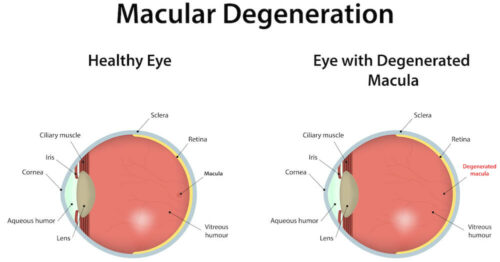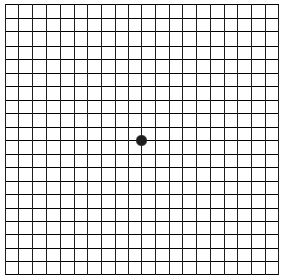
Why does Macular Degeneration occur and what can be done to prevent Macular Degeneration?
While the most important risk factor for macular degeneration is age, it is not yet understood why macular degeneration occurs in some seniors and not in others.
There may be some inherited factor that predisposes individuals to have this condition, and research to identify the genes which are associated with macular degeneration is ongoing. The development of drusen and the slow loss of retina cells that sometimes occurs is not preventable by any means yet identified. However, if the genetic basis of macular degeneration was identified, it might be possible to correct the defect before macular degeneration can begin. Many researchers are working on this question, but it remains a difficult problem.
If a person has macular degeneration, it appears that keeping the entire body healthy—control of blood pressure, control of cholesterol, good nutrition, and avoiding cigarettes—helps to reduce the risk of developing vision loss. The Age-Related Eye Disease Study (AREDS) was a major study sponsored by the National Eye Institute (NEI). In the study, scientists looked at the effects of zinc and antioxidants (vitamin C, vitamin E & beta carotene i.e. provitamin-A), on patients with cataracts and age-related macular degeneration (AMD). Patients with intermediate to advanced AMD, as determined by the doctor, who was taking the anti-oxidant and zinc combination had a demonstrable decrease in the incidence of developing wet AMD
While most patients in the study experienced no serious side effects from the doses of zinc and antioxidants used, a few taking zinc alone had urinary tract problems that required hospitalization. Some patients taking large doses of antioxidants experienced some yellowing of the skin. The long-term effects of taking large doses of these supplements are still unknown. Previous studies have shown that individuals who smoke and take beta-carotene are at an even greater risk of developing lung cancer, and therefore current and recent smokers should not take beta-carotene.
If you have intermediate (or advanced macular degeneration in one eye only), talk to your physician about taking nutritional supplements. Your doctor can help you determine if they may be beneficial-and safe-for you, and what types and doses of supplements to take. The doses used in the study were: Vitamin C 500 mg, Vitamin E 400 IU, Beta-carotene 15 mg, Zinc 80 mg, as zinc oxide, Copper 2 mg, as cupric oxide (copper should be taken with zinc because high-dose zinc is associated with a copper deficiency).
An additional factor that may aggravate macular degeneration is unprotected exposure to the sun’s UV rays. While this is not yet proven, most patients find some form of sunglass use (with UV filtration) makes seeing more comfortable and in some cases, certain tints can enhance contrast sensitivity.
What should I watch for?
Your doctor will schedule regular follow-up appointments to monitor your condition. In addition, we strongly recommend monitoring your vision with an Amsler grid (see below) at least twice a week, so that any changes in vision will be recognized as early as possible. Instructions on how to use the grid will be provided.
Any changes on the Amsler grid—waviness of the lines, blank or missing lines, or blurring of the lines—should be reported to your doctor immediately. Early detection is our best defense against visual loss in macular degeneration!


